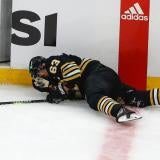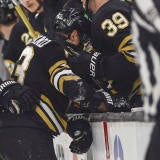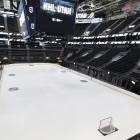The Boston Bruins are dead. After narrowly escaping a seven-game thriller with the Toronto Maple Leafs in the first round, the Bruins were quickly dispatched by the Tampa Bay Lightning in the second round. Things got off to a promising start for the Bruins with a 6-2 road win in Game 1, but the Bolts surged back to take four straight and send the Bruins off to summer vacation.
These were the Eastern Conference's two best teams during the regular season, so what the heck happened for Boston? Let's take a look at where things went wrong.
Lack of production at 5-on-5
The Bruins got six goals at 5-on-5 over the course of the five games in this series. Four of those came in Game 1, and that was the only game in which a Boston forward scored at 5-on-5. The Bruins were completely shut out at 5-on-5 over the final three games of the series.
You have to give credit to Tampa Bay's defensive structure. They've got an excellent top-four on the defensive end and their guys did a great job at blocking shooting and passing lanes in their own zone, limiting what the Bruins were able to accomplish offensively at even strength. They weren't given a whole lot, especially in high-danger areas.
But while the Lightning deserve credit for a great defensive series, it's also fair to expect more out of Boston, who finished the regular season with the sixth-best offense in the league (10th at 5-on-5) .
We knew the Bruins would have a good shot to do some damage on special teams -- Boston's fourth-ranked power play was going up against a Tampa PK unit that was fourth-worst this season -- and they did just that. Boston converted on five of 12 opportunities with the man-advantage, but it wasn't enough to make up for their lack of production in other situations.
Speed and physicality
Part of the reason that the Lightning were so effective defensively is their combination of speed and physicality. Tampa's forward group has a lot of speed and, coupled with their intelligence, they use it wisely.
They were relentless on the forecheck and gave the Bruins fits when it came to the transition game. The Bruins often struggled to get the puck out of their own zone and, when they were able to do so, they were swarmed in the neutral zone and frequently gave possession right back to the Lightning. It was a speed-induced swarm.
But Tampa also managed to beat up on the Bruins pretty good. They may be small on the front end, but the Lightning play pretty ferociously, and they -- along with their powerful guys on defense – punished the Bruins lineup physically.
Heading into the series, Boston's health was already a concern. The Bruins had just come off a grueling seven-game series with the Maple Leafs. They looked pretty gassed at the end of that series and, to make matters worse, they had a quick turnaround to face a well-rested Lightning squad.
As the series went along, it's clear that Tampa's physicality was taking a toll on the Bruins. Guys were getting banged up left and right. Torey Krug was lost for the series in Game 4. David Backes was knocked out in Game 5. Rick Nash's health issues extended into the postseason. Jake DeBrusk was clearly uncomfortable out there.
J.T. Miller’s hit on Backes pic.twitter.com/jJfO2fSo1c
— Pete Blackburn (@PeteBlackburn) May 6, 2018
'Hits' is often an unreliable stat in hockey due to scorer discretion and possession advantages, but you don't really need a numerical value on what the Lightning were able to do against the Bruins in this series.
The Bruins' depth stunk
When looking at the rosters, it would be fair to say that the Lightning and Bruins have two of the deepest rosters in the Eastern Conference, at least in terms of forwards.
However, the level of secondary production and contribution was a landslide victory for the Lightning in this series.
Outside of Game 1, the Bruins' heralded top line didn't exactly blow the doors off the competition, but they were solid. Patrice Bergeron, Brad Marchand and David Pastrnak combined for 23 points over the five games. Bergeron scored five times.
They didn't get much help at all.
Only three forwards outside of that top line even registered a point in the series (David Krejci, Rick Nash, Jake DeBrusk) and only two of them (Krejci, Nash) had more than one point.
Not a single member of the Bruins' bottom-six got on the score sheet. Not good!
The Lightning's depth did not stink
Meanwhile, the Lightning got contributions throughout the lineup. Tampa only had two forwards on the roster held scoreless in the series (Chris Kunitz and Ryan Callahan), both on the fourth line. Both of those guys were able to contribute in other ways; Callahan was a plus-two, Kunitz a plus-one.
The Lightning's second and third lines were great in the series, and their best forward was Brayden Point. His line had a rough go of things trying to shut down Boston's top line in Game 1, but they bounced back and had a very strong two-way series. Point finished with a team-high seven points and was a plus-seven over the final four games of the series.
Really nice play by Point, but…my goodness…not what you’re looking for on D or in net pic.twitter.com/JE52BjRTIb
— Pete Blackburn (@PeteBlackburn) May 4, 2018
Those secondary contributions made a major difference for Tampa, especially considering their two-headed beast of Steven Stamkos and Nikita Kucherov on the top line had a relatively tame series.
Hell, even Dan Girardi had two goals! What is happening?!
Tough luck
I don't want to harp on this too much because nobody likes hearing people complain about officiating, but I'd remiss if I didn't make mention of it: The officiating was absolutely terrible in this series. (Honestly, it's been pretty terrible across the board these entire playoffs.)
And let's just be clear here: Not every call went against the Bruins, and they certainly didn't lose because of bad officiating. They were thoroughly outclassed by the Lightning for most of the series, so you can't say that the officiating was the story of the Bruins' demise.
With that being said, it's hard to argue against it being part of the story.
A few of the missed calls certainly didn't help the Bruins. Brad Marchand had a chance to tie Game 2 with a late breakaway opportunity, but a blatant slash to his hands extinguished the opportunity and went unpenalized. Obviously, there's no guarantee the Bruins would have converted on the game-tying opportunity and prevented the series from being tied, but it was an egregious missed called nonetheless.
If you’re not going to call this you shouldn’t be allowed to have a job pic.twitter.com/8BsJE4EHRy
— DL (@davelozo) May 1, 2018
The same can be said for the sequence in Game 4 that led to Steven Stamkos' game-tying goal, which forced overtime. Nikita Kucherov took down Charlie McAvoy in his own end, leading to a change in possession that quickly turned into an equalizer for Tampa. That play could have resulted in a holding or tripping penalty that may have swung Game 4 in Boston's favor to tie the series 2-2, but it resulted in neither and the Lightning won in OT.
Lightning get away with a hold, Stamkos ties the game pic.twitter.com/VCrepEpP11
— Pete Blackburn (@PeteBlackburn) May 5, 2018
There were other less consequential misses by the stripes (again, for both sides) but those are the ones that are going to marinate with Boston fans for a while.
But the Bruins' bad luck wasn't limited to officiating. Losing Krug in Game 4 because of an unfortunate (and very ugly) crash into the boards was a huge blow, especially for a Boston team that was heavily relying on the power play, where Krug thrives. Being forced to work with a short bench after injuries to Backes and Nash in an elimination Game 5 didn't help either.
But whether it's officiating or injuries, bad luck is something that every team encounters on the long road to the Stanley Cup Final, and it's often where good teams get separated from the great ones. The Bruins weren't nearly good enough in other areas to make up for what they lacked in luck.






















